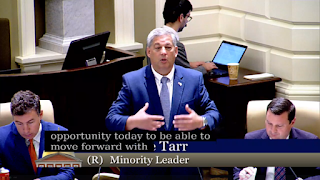Thursday, September 28, 2023
Senate Gives Final Approval to Tax Relief Measures | 9.28.2023
Senate Gives Final Approval to Tax Relief Measures
Today the Senate took action, long in the making, to provide desperately needed tax relief to respond to household budgets under stress and employers struggling to compete in a state whose costs are a major challenge.
I have been honored to not only serve on the conference committee for this legislation, but also to work across the aisle consistently to build consensus and partnership on a matter that has been a top priority for the Senate Republican caucus for years, and a necessity for the people who pay the bills for our state government.
Over the past two years, we have worked to illustrate the heavy burdens being carried by people in our state for things ranging from childcare to housing, and the uphill climb employers are facing on the road to greater prosperity for our economy. This legislation is a major first step that will make a real difference for all of them.
The following provisions are included in House Bill 4104:
• Changes in the tax credit for a dependent child, disabled adult,
or senior, which will increase from $180 to $310 in FY23 and to
$440 in FY24, and will benefit over 565,000 families;
• An increase in the rental deduction cap from $3,000 to $4,000,
which will assist approximately 800,000 renters;
• An increase in the Earned Income Tax Credit from 30% to 40%
of the federal credit, which will benefit approximately 400,000
taxpayers earning less than $60,000;
• A doubling of the maximum Senior Circuit Breaker tax credit
from $1,200 to $2,400, indexed to inflation, which will assist
nearly 100,000 seniors;
• The elimination of the estate tax for all estates valued under
$2 million and the establishment of a uniform credit of
$99,600, effective January 1, 2023;
• Provisions allowing municipalities to provide up to $2,000 in
property tax reductions for older residents participating in the
senior work-off program, which is currently capped at $1,500;
• A reduction in the tax on short-term capital gains from 12% to
8.5%;
• The replacement of the current three-prong sales tax
apportionment for Massachusetts-headquartered businesses
that incorporates property, payroll, and sales with a new
system that only factors in sales;
• An increase in the maximum tax credit for septic tank repairs
or replacement under Title V from $6,000 to $18,000, and an
increase in the amount that can be claimed to $4,000 per year;
• The doubling of the lead paint abatement to $1,000 for partial
abatement and $3,000 for full abatement;
• An increase in the statewide cap on the Housing Development
Incentive Program (HDIP) from $10 million to $57 million for
one year, after which the annual cap will be set at $30 million;
• An increase in the annual authorization for the Low Income
Housing Tax Credit from $40 million to $60 million;
• Provisions allowing cities and towns to adopt a local property
tax exemption for renters whose income falls below a certain
level set by the community;
• Language making public transit fares and certain other
expenses eligible for the commuter expenses tax deduction;
and
• Provisions exempting employer student loan payments from
being counted as taxable income by the state.
House Bill 4104 is now on Governor Maura Healey’s desk for her review and signature.

